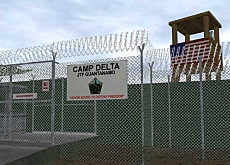Swiss artists break into Guantanamo

Ever wanted to get into Guantanamo Bay without getting locked up or shot? Thanks to two Swiss artists you can be inside at the click of a mouse.
The pair have created a 3D computer reconstruction of the notorious United States naval base in Cuba, which can be downloaded from their website Zone*Interdite (Restricted Zone).
The art project offers basic information on 1,200 military bases around the world. But its star turns are virtual tours of Guantanamo and an Islamic training camp in Sudan.
Christoph Wachter and Mathias Jud, who are based in Berlin, started compiling material on military installations in 2000 after being intrigued by forbidding Cold War bases.
“Our perception of the world is incomplete,” the pair say on their website. “What we see is dictated by rules, which were not set by us… we end up again and again in front of barriers and restricted areas.”
The aim of the website is to fill in the gaps and they hope to achieve with photos, reports, and facts furnished by visitors to Zone*Interdite – free from censorship.
Spying mission
Nuggets of information have already been gathered courtesy of the internet, the media, a US army veteran’s photo album and even the US Defence Department. The result enables users to feel like a “spy on a mission”.
“Zone*Interdite fills in the blank spaces on the map and the blind spots in our perception,” say Wachter and Jud. “These virtual tours enable expeditions to take place on a terrain where sovereignty no longer belongs to the national state but to each human being.”
At the heart of the site is the 3D reconstruction of Guantanamo where hundreds of suspected al-Qaeda and Taliban members have been held since 2002.
The tour opens with an aerial shot of Windmill Beach; once inside the base, visitors are free to roam about the facility and barracks, and even venture inside a cell.
Getting around Guantanamo requires a certain amount of patience or a powerful computer. But on the plus side, pages for each of the 1,200 military bases carry a link to the Google search engine and a host of facts and figures on the installation in question.
Digital age
This abundance of information proves that no matter how secretive these bases are, they “always end up being exposed in the media”. Especially since in the digital age everyone takes photos – including the military.
Some might argue that Zone*Interdite is trivial and voyeuristic. But the two artists say it is more a question of “overcoming our partial blindness” and gaining access to places that one is not supposed to think about.
Manon Schick, spokeswoman for the Swiss branch of Amnesty International, welcomed the art project as “putting a spotlight on the horrors of the detention conditions” at Guantanamo.
“It helps to increase awareness of this place where international law doesn’t exist,” she said, adding that Guantanamo remained inaccessible.
“Recently United Nations experts cancelled a planned visit because they were not allowed to visit the 500 prisoners detained there.”
swissinfo, Isabelle Eichenberger
Christoph Wachter was born in Zurich in 1966 and has lived in Berlin since 1991. He has held exhibitions in both Switzerland and Germany and received several grants from the city and canton of Zurich. He launched the Zone*Interdite project in 2000.
Mathias Jud was born in Zurich in 1974 and splits his time between the northern Swiss city and Berlin. He studied organic chemistry at the Federal Institute of Technology in Zurich and has worked as a molecular biology researcher.
He is the owner and founder of saibo.ch, a graphics, media and communications agency that specialises in 3D models and animation.
The US government has held suspected al-Qaeda and Taliban members in Guantanamo’s Camp Delta since 2002.
According to human rights groups, 500 detainees from 35 countries are held there.
The Swiss government and the International Committee of the Red Cross, which visits the detainees regularly, have repeatedly expressed concern at the legal vacuum in which they are being held.

In compliance with the JTI standards
More: SWI swissinfo.ch certified by the Journalism Trust Initiative

You can find an overview of ongoing debates with our journalists here. Please join us!
If you want to start a conversation about a topic raised in this article or want to report factual errors, email us at english@swissinfo.ch.